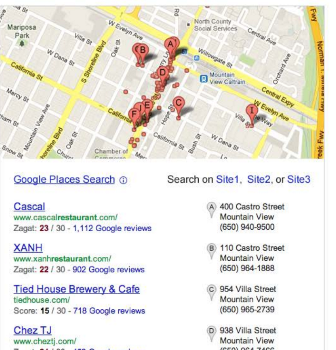
Roundup of Comments on Google’s Proposed Commitments to European Commission
The European Commission today announced Google’s proposed commitments to settle allegations that it is abusing its dominance by giving preferential treatment to its own services in display and ranking of search results.
Google proposal to label where it promotes its own products above generic search results and offer links to “three rival specialised search services close to its own services, in a place that is clearly visible to users.” The Commission explained its concern about Google’s search bias in a Q&A memo the Commission released along with Google’s proposal:
“In particular, the Commission is concerned that the way in which Google currently presents its web search results limits the ability of European users to find their way to specialised search services competing with Google which contain information relevant to their query. Many such services might be potentially very innovative and Google’s practices could therefore be limiting European consumers’ opportunities to benefit from such innovative services. At the same time, it is for users to decide whether they wish to visit these sites based on their merits.”
Thomas Vinje, EU counsel to FairSearch said the following about Google’s proposal (click for full statement):

Here’s one example from Google’s proposed commitments of how it would “change” the preferential display of Google’s own products, a key concern identified by the European Commission in its investigation.
“FairSearch applauds the Commission for laying out a clear and compelling case that Google is abusing its dominant position by giving its own products preferential treatment in search results. This is an important conclusion that must lead to meaningful remedies…
“We have always said that the best remedy for consumers and innovation would be to require Google to apply the same policy to search results for its own products as it does to all others.”
Other outside experts said Google’s proposal offers little to change the preferential treatment for its own products highlighted as a concern by the Commission. Search Engine Land contributing editor Greg Sterling observed:
“While the three competitive links are likely to drive some traffic to Google alternatives, from a user experience standpoint this is not the radical change I was imagining. In addition there’s apparently no requirement or constraint around where Google can put universal search results on the page. In other words, it can still show products, maps, flight search and so on, where it likes.”
In a separate piece, Sterling comes close to endorsing FairSearch’s call for Google to apply the same policy in ranking and displaying its products as it does all other sites in natural search results:
“One suggestion made by a third party was that Google’s ‘verticals’ be subject to the same algorithm as its content-publisher competitors. While that would negatively impact Google’s vision of its user experience (and would have profound implications for Google Now and mobile search results) that’s a better approach than the ‘top three box’ currently being proposed.”
Meanwhile, Danny Sullivan, editor of Search Engine Land, tweeted a picture of how Google already displays information from rivals on stock ticker queries.
Mockup of how Google may show links to rivals under EU settlement. Oh, wait, it already does this twitter.com/dannysullivan/…
— Danny Sullivan (@dannysullivan) April 25, 2013
Other commentators picked up on the same point, expressing disappointment in Google’s proposal. John Simpson of Consumer Watchdog’s Inside Google wrote:
“The bad news is that instead of requiring Google to change its algorithm and treat all services the same, the deal will apparently allow Google to continue favoring its own services in search results so long as it labels them as its own … Another problem with the deal is that it doesn’t seem to do anything to rectify the damage to the market that Google has already wreaked.”
BEUC The European Consumer Orgainisation echoed that view in a statement:
“Labelling results will do little or indeed nothing to prevent Google from manipulating search results and discriminating against competing services. It may even shepherd consumers towards clicking on Google services now highlighted in a frame. Labelling should not be the sole solution…
“The proposal to display links to three rival specialised services raises the natural question of who decides the promotional criteria. If that is Google, it leaves too much discretion in their lap while most importantly, not solving the problem of non-discriminatory choices for consumers.”
Shivaun Raff, co-founder of the UK vertical search company Foundem, a FairSearch member and one of the original complainants to the EC in spring 2010, told The Guardian:
“The only foolproof way to tackle abusive practices is to end them. Ultimately, the only way to end Google’s search manipulation practices and restore a level-playing field is to ensure that Google holds all services, including its own, to exactly the same standards, using exactly the same crawling, indexing, ranking, display, and penalty algorithms.”
In a piece entitled, “Google’s Entirely Trivial Settlement With The European Commission,” Forbes contributor Tim Worstall wrote:
“These terms are essentially trivial: amounting to little more than an admonition to play nice with the other boys and girls in the sand pit … So the great question becomes well, why have we had so much gnashing of teeth and a’wailing to end up with such a damp squib of a result?”
Ed Barton, an analyst at Strategy Analytics, told Bloomberg:
“I don’t think this is a particularly significant gesture … It doesn’t impose any changes on Google’s core search algorithm, which is the most important aspect, just the presentation of the results.”
FairSearch plans to study the proposal in detail and offer an empirical analysis based on actual tests on the effectiveness of Google’s proposals. Early indications from other observers are that it’s not yet clear that Google’s proposal will bring meaningful changes to Google’s abuse of dominance.
